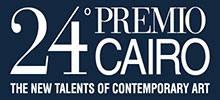Giulia Cenci
Vasca da bagno, resina, polveri, pigmenti, cm 83,5x193,5x82,5.
"When the human condition is disrupted by a hostile and disturbing present, artists know how to make themselves lucid interpreters of reality. For being able to represent with formal power the encounter between living beings and technological mutations, between natural and artificial, between identity and otherness, the jury unanimously awards the 21st Premio Cairo to the work "Untitled" by Giulia Cenci."
Her work won the prize of 25,000 euros.
Born in Cortona in 1988, she trained at the Academy of Fine Arts in Bologna and St. Joost Academy in Breda, Netherlands. A finalist for the MAXXI Bulgari Prize 2020, major milestones include the exhibitions Tallone di ferro at Museo Novecento (Florence, 2021), Futuruins at Palazzo Fortuny (Venice, 2019) and participation in 2022 in the 59th Venice Art Biennale
The protagonists of the works by Giulia Cenci (Cortona, 1988, lives in Amsterdam and Cortona) are disturbing hybridizations of man, animal and machinery. In the case of the work created for the Cairo Prize, Untitled, a wolf (the cast of a taxidermist's silhouette) is submerged in a whirlpool: its outstretched posture may recall that of a man enjoying refreshment, but also that of a lifeless or dead animal-and as an implication, a grotesque quotation from Jacques-Louis David's Death of Marat winks out. The tank is "gutted" and allows glimpses of its inner components, its "skeleton," as if it too were an organism or as if it were part of a single body along with the wolf. With her usual use of salvaged materials combined with the cast technique, the artist pursues her reflection on "organic body and artificial body," as she explains.
"I am keen to explore the relationship with the machines we have created: they are our extensions, but at the same time we are subservient to them." Often organized in complex, whole-room installations, in this case in the form of a single sculptural/installation element, the artist's works court the macabre and paradoxical by prompting the viewer to question what he or she is seeing. The initial revulsion also leads to a mirroring in the work by the viewer, to questions about contemporary technological drift, the idea of underlying and explicit violence, but also about the resilience of the individual in a complex and in many ways hostile world.
Stefano Castelli
